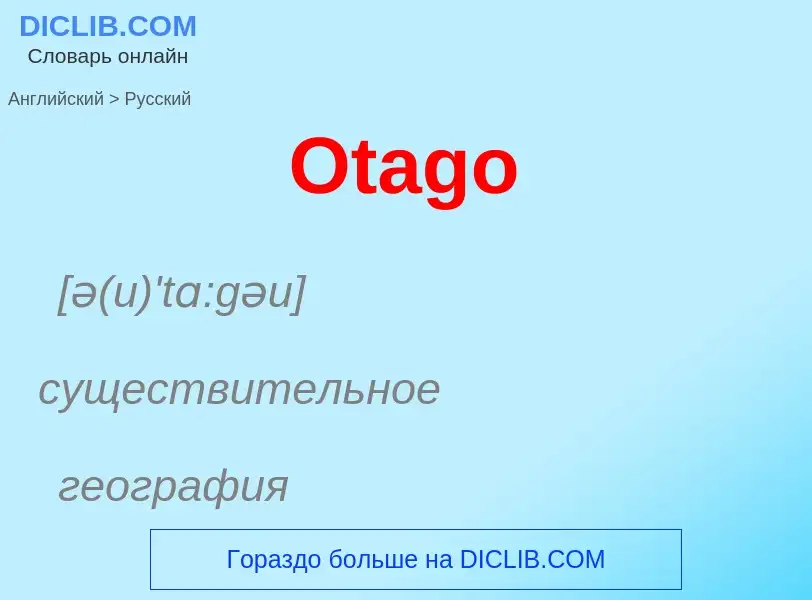Перевод и анализ слов искусственным интеллектом ChatGPT
На этой странице Вы можете получить подробный анализ слова или словосочетания, произведенный с помощью лучшей на сегодняшний день технологии искусственного интеллекта:
- как употребляется слово
- частота употребления
- используется оно чаще в устной или письменной речи
- варианты перевода слова
- примеры употребления (несколько фраз с переводом)
- этимология
Otago - перевод на русский
[ə(u)'tɑ:gəu]
существительное
география
Отаго (провинциальный округ Новой Зеландии)
[dʌ'ni:dɪn]
поэтическое выражение
Данидин (Эдинбург)
от гэльск. крепость на откосе
существительное
география
г. Данидин
Данедин
Википедия
Otago ( (listen), ; Māori: Ōtākou [ɔːˈtaːkou]) is a region of New Zealand located in the southern half of the South Island administered by the Otago Regional Council. It has an area of approximately 32,000 square kilometres (12,000 sq mi), making it the country's second largest local government region. Its population was 246,000 in June 2022.
The name "Otago" is the local southern Māori dialect pronunciation of "Ōtākou", the name of the Māori village near the entrance to Otago Harbour. The exact meaning of the term is disputed, with common translations being "isolated village" and "place of red earth", the latter referring to the reddish-ochre clay which is common in the area around Dunedin. "Otago" is also the old name of the European settlement on the harbour, established by the Weller Brothers in 1831, which lies close to Otakou. The upper harbour later became the focus of the Otago Association, an offshoot of the Free Church of Scotland, notable for its adoption of the principle that ordinary people, not the landowner, should choose the ministers.
Major centres include Dunedin (the principal city), Oamaru (made famous by Janet Frame), Balclutha, Alexandra, and the major tourist centres Queenstown and Wānaka. Kaitangata in South Otago is a prominent source of coal. The Waitaki and Clutha rivers provide much of the country's hydroelectric power. Vineyards and wineries have been developed in the Central Otago wine region. Some parts of the area originally covered by Otago Province are now administered by either Canterbury Regional Council or Southland Regional Council.

![[[Arrowtown]], a historic mining town [[Arrowtown]], a historic mining town](https://commons.wikimedia.org/wiki/Special:FilePath/Arrowtown (4678481119).jpg?width=200)

![State Highway 8]] runs from left to right across the photo (only visible in the right half), and crosses the [[Clutha River]] just below centre. State Highway 8]] runs from left to right across the photo (only visible in the right half), and crosses the [[Clutha River]] just below centre.](https://commons.wikimedia.org/wiki/Special:FilePath/Beaumont, New Zealand aerial photo 2006.jpg?width=200)
![Roaring Meg]] joins the [[Kawarau River]], in central Otago Roaring Meg]] joins the [[Kawarau River]], in central Otago](https://commons.wikimedia.org/wiki/Special:FilePath/Kawarau Gorge and Roaring Meg.jpg?width=200)
![[[Mount Aspiring / Tititea]] is New Zealand's highest mountain outside the [[Aoraki / Mount Cook]] region. [[Mount Aspiring / Tititea]] is New Zealand's highest mountain outside the [[Aoraki / Mount Cook]] region.](https://commons.wikimedia.org/wiki/Special:FilePath/Mount Aspiring, Otago, New Zealand, 22 July 2005.jpg?width=200)



![[[Baldwin Street]] in North East Valley is the world's steepest residential street [[Baldwin Street]] in North East Valley is the world's steepest residential street](https://commons.wikimedia.org/wiki/Special:FilePath/BaldwinStreet Descending Tourist.jpg?width=200)



![[[Dunedin International Airport]] – an Air New Zealand 737 lands on the runway while an Air New Zealand A320 waits on the taxiway [[Dunedin International Airport]] – an Air New Zealand 737 lands on the runway while an Air New Zealand A320 waits on the taxiway](https://commons.wikimedia.org/wiki/Special:FilePath/Dunedin International Airport3.jpg?width=200)
![Dunedin (grey area to lower left) sits close to the isthmus of the [[Otago Peninsula]], at the end of [[Otago Harbour]] Dunedin (grey area to lower left) sits close to the isthmus of the [[Otago Peninsula]], at the end of [[Otago Harbour]]](https://commons.wikimedia.org/wiki/Special:FilePath/Dunedin Otago Peninsula Harbour.jpg?width=200)
![[[Dunedin railway station]], built in 1906, is famed for its "gingerbread" architecture. [[Dunedin railway station]], built in 1906, is famed for its "gingerbread" architecture.](https://commons.wikimedia.org/wiki/Special:FilePath/Dunedin Railway Station Full Exterior.jpg?width=200)

![[[First Church of Otago]] [[First Church of Otago]]](https://commons.wikimedia.org/wiki/Special:FilePath/First Church, Dunedin, NZ.jpg?width=200)
![Fortune Theatre]] laid claim to being the world's southernmost professional theatre company Fortune Theatre]] laid claim to being the world's southernmost professional theatre company](https://commons.wikimedia.org/wiki/Special:FilePath/FortunetheatreNZ.jpg?width=200)

![Designline]]-built buses, operated by Citibus (now Go Bus) on Dunedin urban routes Designline]]-built buses, operated by Citibus (now Go Bus) on Dunedin urban routes](https://commons.wikimedia.org/wiki/Special:FilePath/Low floor.jpg?width=200)


![Princes Street]] was developed during Dunedin's 1860s boom from the gold rush, and consequently is one of New Zealand's most historic streets Princes Street]] was developed during Dunedin's 1860s boom from the gold rush, and consequently is one of New Zealand's most historic streets](https://commons.wikimedia.org/wiki/Special:FilePath/PrincesStDunedin.jpg?width=200)
.jpg?width=200)
![St Clair]] St Clair]]](https://commons.wikimedia.org/wiki/Special:FilePath/St Clair, New Zealand.jpg?width=200)
![[[Taiaroa Head]] with lighthouse. [[Taiaroa Head]] with lighthouse.](https://commons.wikimedia.org/wiki/Special:FilePath/Taiaroa Head 2.jpg?width=200)


